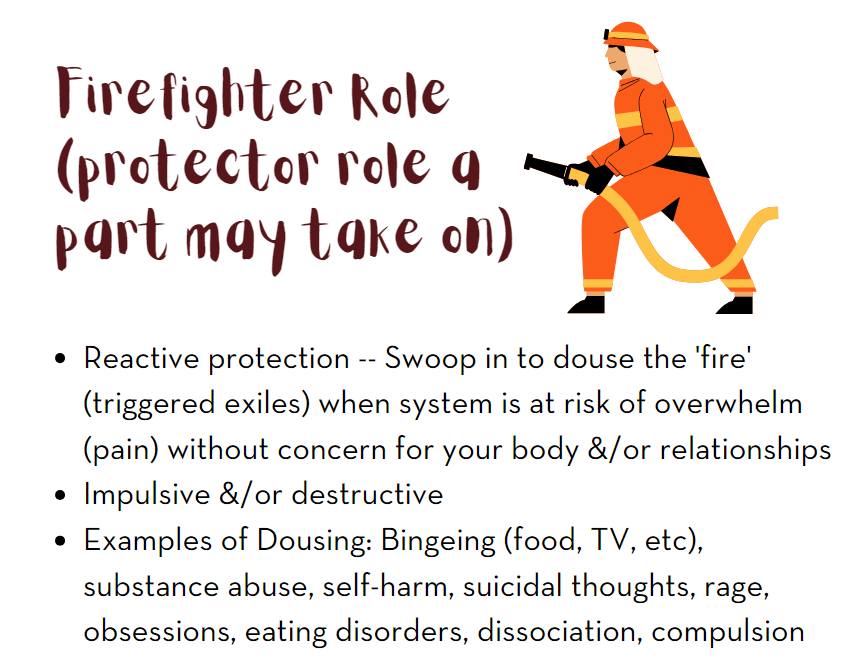Assessing Imposter Syndrome through an Internal Family Systems (IFS) Lens
Thanks to WELCOA’s insightful article Can We (Please) Move Beyond Imposter Syndrome?, I have revisited and updated this post. The article helped shed light on the complex nature of Imposter Phenomenon, initially identified in a 1978 study focusing on high-achieving women. It emphasizes that the cultural context, including issues of bias and discrimination of that time, has evolved, and modern interpretations must consider these shifts rather than focusing on individual blame. A special thanks to WELCOA and Meghna Majmudar for their wisdom on this subject. Meghna, an Executive Coach with 25 years of experience, has an impressive background, supporting leaders who are often the “first” or “only” in their professional domain, and holds degrees from Harvard, the University of Cape Town, and UC-Berkeley’s Haas School of Business. 🌟
Imposter Syndrome involves an internal struggle where individuals doubt their achievements and fear being exposed as frauds despite evidence of their competence. The Internal Family Systems (IFS) approach by Richard Schwartz, PhD can offer us a unique lens to comprehend and address this phenomenon. As Richard Schwartz, PhD says: “the mind is not a singular entity or self, but is multiple, composed of parts.” In IFS acknowledges that we have various parts, each with its own perspective, interests, and way of contributing to the individual’s overall wellbeing. There are no bad parts. All parts have helpful intentions (intent to help the system). Collectively these parts make up an inner fam, hence: Internal Family Systems. There is also a “part that’s not a part,” which IFS calls Self. This is our true, core essence. When we show up with a lot of Self Energy in the system, we see qualities like compassion, calm, etc (see below):

The clamor of parts can block out Self Energy. One of the goals of IFS is to have inner harmony: parts that are led by Self. Lots of Self Energy.
Understanding the Potential Roles Parts Involved in Imposter Syndrome
Within the IFS framework, Imposter Syndrome is mostly likely the result of intricate interplays among distinct parts, all contributing to a complex internal web of self-doubt, insecurity, and fear.
Below you will see an intro to the different roles our parts sometimes take on. Though the graphics are generic, the associated text describes what we might see with imposter syndrome. I offer SOME examples. There are many more possibilities.

Exiles: Exiles carry the pain of past traumas and experiences. As the term “exile” implies, these exiles are, well… exiled. They get the double whammy: they carry a burden (wound) AND other parts rally to helpfully/”helpfully” tuck them away somewhere so that the pain they carry cannot flood the internal system.

Managers: Managers are proactive protectors operating to keep emotional pain at bay by banishing exiles and making sure they stay banished. Perhaps they set high standards, strive for perfection, or employ control mechanisms to avoid potential failures. Their intention is to ensure safety and prevent exposure to vulnerabilities, even though these efforts can paradoxically amplify Imposter Syndrome.

Firefighters: Firefighters are reactive protectors that work to “put out the fire” as the pain of an exile starts to flood the system. This might mean employing strategies like overworking, procrastination, or impulsive behaviors. Their actions are often aimed at providing temporary relief from feelings of self-doubt. While their intent is to mitigate our distress, their behaviors can inadvertently perpetuate the cycle of Imposter Syndrome.
Healing and Self-Compassion through IFS
The IFS model offers a path to address Imposter Syndrome by understanding and being compassionate with these parts. By fostering dialogue and harmony among them, individuals can cultivate self-compassion and self-awareness. IFS Therapy guides the journey, which in part allows parts to drop their burdens — the extreme roles they took on in past situations. These extreme roles were necessary at one time, but now they might not be so helpful (though the helpful intent is still there). IFS always seeks permission from the whole inner fam. The strategy is to first get to know and then unburden the protector parts. When unburdened, these parts can release the heavy responsibilities they’ve carried and transition into more beneficial roles. With time and permission, IFS works to heal the wounds that the exiles carry. As a result, these parts can gradually return to their innately beautiful and authentic childlike roles, restoring a sense of wholeness, well-being, and inner harmony to the individual’s inner world.
Below I am outlining parts that may be involved in Imposter Syndrome. In the Resources section at the bottom, I am linking to an IFS mediation (to help meet your parts). I also recommend checking out this article, as it is chock full of resources. Part of the beauty of IFS is that you get to name your own parts. The list below is just to give you an idea of what wounds may be involved and what protector parts might be doing (proactively and reactively).
Exiles:
- Inadequacy Exile:
- Role: Holds feelings of not being good enough or capable.
- Holds wounds of: Feeling inadequate and unworthy, including feeling inadequate due to external validation being denied based on gender, race, or other factors.
- Event(s): Previous experiences of not meeting expectations or receiving criticism; Experiences of being undermined or not taken seriously due to one’s identity.
- Failure Exile:
- Role: Carries past memories of failures or mistakes that contribute to self-doubt.
- Holds wounds of: Painful memories of failures and mistakes.
- Event(s): Past instances of not achieving desired outcomes or making errors
- Rejection Exile:
- Role: Holds fears of rejection or not being accepted by others.
- Holds wounds of: Emotional pain from feeling rejected and isolated (e.g. being left out of childhood games, being met with parental indifference when emotional support was needed, being treated unfairly or being targeted based on one’s identity, etc)
- Event(s): Instances of being excluded, criticized, or not receiving validation; Encountering bias or discrimination that leads to exclusion, isolation, and/or being ostracized or overlooked.
- Unworthiness Exile:
- Role: Carries beliefs of not deserving success or recognition.
- Holds wounds of: Deep-seated feelings of unworthiness; Feeling unworthy of opportunities and recognition due to being overlooked or undervalued based on identity, or perhaps due to younger wounds from childhood experiences
- Event(s): Past experiences that led to feelings of being undeserving or not good enough, including experiencing bias that communicates that one’s accomplishments are less valued due to identity factors; Facing bias that undermines one’s sense of worth and contribution.
Managers: Proactive Protectors
- High Standards Manager:
- Role: Sets excessively high expectations to achieve success.
- Helpful Intent: Proactively protects (keeps the exile away) by motivating achievement and pushing for excellence to gain recognition and avoid criticism.
- Comparison Manager:
- Role: Compares achievements to others, leading to feelings of not measuring up.
- Helpful Intent: Proactively protects by driving improvement and pushing to excel to prove competence and worthiness.
- Control Manager:
- Role: Tries to manage every detail to avoid potential failure.
- Helpful Intent: Proactively protects by preventing unforeseen challenges and minimizing risk to safeguard against perceived inadequacy.
- Self-Sufficiency Manager:
- Role: Must handle everything independently to prove competence.
- Helpful Intent: Proactively protects by demonstrating self-reliance and independent success.
Firefighters: Reactive Protectors
- Overwork Firefighter:
- Role: Engages in excessive work to drown out feelings of inadequacy.
- Helpful Intent: Reactively protects by providing a sense of accomplishment and worth through productivity while avoiding facing self-doubt (keeping the exile and pain the exile carries banished).
- NOTE: Though not mentioned above, overwork can also be a proactive strategy to keep an exile at bay.
- Procrastinator:
- Role: Delays tasks to avoid the possibility of failure.
- Helpful Intent: Reactively protects by preventing immediate exposure to situations that could trigger self-doubt or criticism (e.g. trigger an “exile escape”).
- Deflection Firefighter:
- Role: Shifts focus from feelings of inadequacy by criticizing or blaming others.
- Helpful Intent: Reactively protects by dousing out rising pain, defending against feelings of vulnerability and inadequacy through redirecting attention.
- Impulsive Behavior Firefighter:
- Role: Engages in impulsive behaviors to numb or distract from self-doubt.
- Helpful Intent: Reactively protects by providing temporary relief from distressing emotions by replacing them with excitement or urgency.
Again, the list above is not complete or prescriptive. There are many possible parts in the mix. And, as an additional layer, when we notice that we feel this imposter syndrome feeling, there may be parts that attempt to be helpful in light of all of these feelings: Perhaps by popping up to exhibit prosocial or antisocial responses, especially when they feel excluded or not recognized for their true capabilities. This is particularly relevant in professional settings, where an individual’s parts might respond to perceived exclusion or underappreciation in ways that echo broader social dynamics. For example, each of these prosocial responses reflects the parts’ attempts to deal with the underlying feelings of Imposter Syndrome (and the root issues as well):
- Trying to Win Over Those Who Excluded Them: The Pleaser parts, for example, might increase efforts to gain the approval and acceptance of those they perceive as having excluded or undervalued them. This could manifest in the workplace as going above and beyond to impress a supervisor or a team that an individual feels unrecognized by.
- Complying More with Group Norms or Demands: Manager parts may respond to Imposter Syndrome by pushing the individual to adhere more strictly to group norms or demands. This is a strategy to minimize the risk of further exclusion and to demonstrate their value and competence to the group.
- Showing Liking for New Groups or Individuals: Parts that feel excluded might lead the individual to form connections with new groups or individuals. This might be an effort by these parts to find a place where the individual feels more accepted and valued, thereby alleviating feelings of being an imposter.
- Mimicking Behaviors of Others: Some parts might subconsciously encourage the individual to mimic the behaviors, mannerisms, or work styles of others who are perceived as successful or competent. This mimicking can be seen as an attempt to blend in or to be perceived as equally capable.
- Seeking Alternative Social Connections: In response to feelings of exclusion or inadequacy, certain parts might motivate the individual to seek new social connections or networks, both within and outside the workplace. This can be a way to find new sources of validation and recognition.
- Displaying Increased Cooperative and Helpful Behaviors: Especially in a workplace setting, some parts might lead to an increase in cooperative and helpful behaviors. This can be seen as an attempt to build positive relationships, demonstrate value to the team, and counter feelings of being an imposter.
We might also see helpful/”helpful” parts pop up to exhibit antisocial behaviors to deal with Imposter Syndrome and the underlying contributing factors of Imposter Syndrome:
- Acts of Aggression or Revenge: Firefighter parts, often reactive and impulsive, may drive the individual to engage in behaviors that can be perceived as aggressive or vengeful. In a workplace context, this might manifest as sharp retorts in meetings, passive-aggressive communication, or subtle undermining of colleagues’ efforts. These actions are typically a “misguided”helpful” attempt to regain a sense of control or to ‘even the score’ in response to feelings of being unfairly treated or undervalued.
- Engaging in Risky or Self-Harming Behaviors: Some parts may lead the individual to engage in risky behaviors that can be detrimental to their career or personal life. This could include making impulsive decisions without fully considering the consequences, taking unnecessary risks in their work, or even neglecting their own well-being. These behaviors often serve as a way to distract from or numb the feelings of inadequacy and unworthiness at the core of Imposter Syndrome.
- Reduced Engagement or Participation: Disengaged parts may emerge in response to feelings of exclusion, leading to a withdrawal from active participation or engagement in the workplace. This can appear as doing the bare minimum required, not volunteering for new projects or initiatives, or generally adopting a more passive stance in professional settings. It’s a protective mechanism to avoid further exposure to situations that might reinforce the internal narrative of being an ‘imposter.’
Takeaways
We can almost imagine Imposter Syndrome as an onion, with its multiple layers representing a variety of parts in our internal system. At the very core of this onion would lie the Exiles, burdened with deep-seated wounds and intense feelings of inadequacy. These are the parts that often fuel the core feelings of being an imposter.
Wrapped around this vulnerable core are layers of Protectors. (1) Managers. These parts work tirelessly to protect us, setting high standards and exerting control to prevent failures and keep the Exiles’ pain from surfacing. They are the strategists, constantly attempting to keep the system safe and functioning. (2) Firefighters, the crisis responders, often engaging in reactive and sometimes extreme behaviors to immediately quell emotional uprisings.
The work of the protector parts may leave us with a feeling of imposter syndrome. Thus surrounding these inner layers, we might find another set of Managers and Firefighters, perhaps those that exhibit prosocial behaviors, striving to adapt and fit in, or antisocial responses, acting out in ways that can seem counterproductive or self-sabotaging. Each layer, each part, plays its role ‘helpfully’ in the context of the system’s history and experiences.
In the journey of healing through IFS, the process often begins by first building a trusting relationship with the “outermost” protective parts – the Managers and Firefighters that are the typical cast of characters that take center stage in your lived experience. It’s about welcoming them, acknowledging their efforts and understanding their protective intentions. As these parts start to trust and allow access, we gradually get closer to the Exiles, the vulnerable parts carrying emotional pain. This careful, respectful approach helps in easing the burdens these parts carry, allowing them to transform and integrate more healthily into the system.
Resources:
- IFS Meditation (Example from YouTube… You will be able to find many more!)
- Positive Psychology (article with lots of IFS activities)
- More BetterAndBetterer Blog Posts (tagged IFS)
- If you can identify the causal event, Havening Techniques® can be potentially used to rapidly heal at the microbiological level. Havening can also be used to build new beliefs, and enhance well-being in lots of ways.
